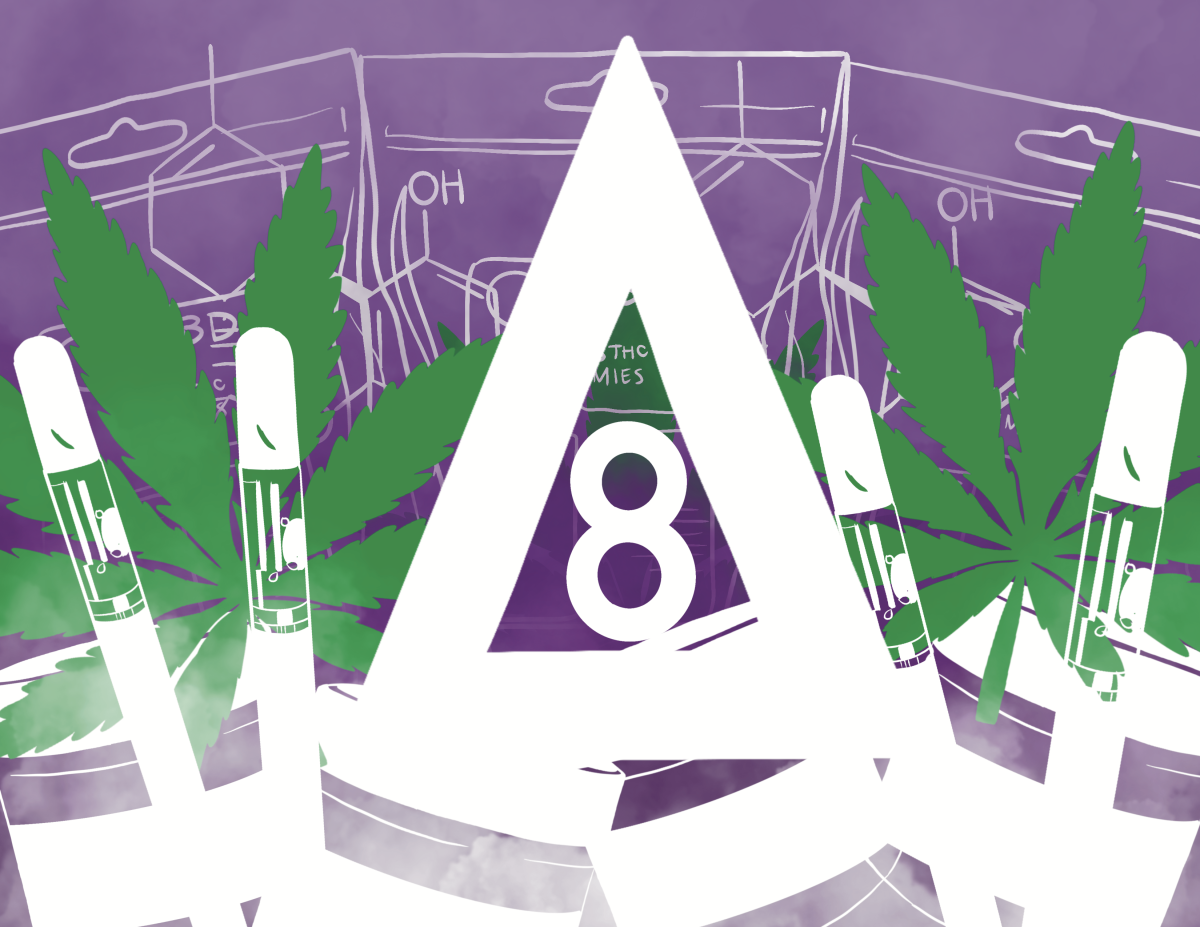With North Carolina being one of 13 states in the battle for full marijuana legalization, cannabis users at NC State can only own non-psychedelic CBD products. But delta-8, a psychedelic synthetic cannabinoid, is legal in North Carolina, and according to Thomas Hardiman, director of Student Conduct, delta-8 products are also allowed on campus.
“There’s no prohibition for delta-8 on our property,” Hardiman said. “It is legal in the state of North Carolina for any smokable forms of any delta-8 substance or CBD substance.”
Through a federal-level loophole in the 2018 Farm Bill, delta-8 products do not have to abide by legalized hemp’s THC limit of 0.3%, which is too low to induce a psychedelic effect. THC, the main psychoactive product in cannabis, is not federally regulated in delta-8 through the 2018 Farm Bill, allowing hemp farmers and retailers to distribute the synthetic cannabinoid near campus.
According to Hardiman, students who smoke delta-8 products on campus must still abide by NC State’s smoking regulations. Like other products such as cigarettes and vapes, delta-8 users cannot smoke inside or near NC State buildings or vehicles.
“Obviously our smoking policies still apply,” Hardiman said. “Can’t do it indoors, have to do it at a distance from a building, and things like that. That would all still apply.”
John Boccela, store owner of The Hemp Company in northern Raleigh, said he recommends new users to start out on low delta-8 dosages, which are about 10 milligrams. Unlike alcohol, strong reactions to THC are not necessarily dictated by body weight, but Boccela said things like eating meals before consuming delta-8 products helps the body metabolize the psychedelic impact.
“It’s not really a body weight thing where you say ‘Well, this person is bigger than that person, so they need twice as much,’” Boccela said. “It doesn’t really work quite like that, so we always say you have to start slow and see how it affects your body.”
While many users and health officials consider delta-8 a lighter form of traditional cannabis, both Boccela and Hardiman said new consumers should research the product’s side effects on the body. According to Boccela, delta-8 produces similar effects to traditional cannabis, including anxiety relaxation, pain reduction and a euphoric high. Hardiman said new consumers should watch out for adverse symptoms such as blood pressure hikes or drops, which cannabis can induce.
“You should be able to have an educated conversation with the person who’s trying to sell you these products so that they can educate you and learn a little bit more about what your needs are and kind of guide you,” Boccela said.
Both Boccela and Hardiman said it’s important to get delta-8 products from reputable sources to ensure purchases are entirely delta-8 and not laced with other substances. According to Boccela, consumers should look for labels in delta-8 products to ensure they are not consuming other, more potentially dangerous substances.
“We have lab reports that are on hand or we have access to those so that we know exactly what’s in it, and more importantly, what’s not in it,” Boccela said. “When you are consuming these products, it’s important that you’re getting something that’s going to be safe and effective.”
On the chance that students have negative experiences using delta-8 or any other alcohol or drug substance, Hardiman said students are encouraged to call 911 and receive help from NC State resources. Students in emergency situations or who make the call will not receive disciplinary punishment for legal or illegal drug and alcohol abuse, according to Hardiman, and 911 calls on campus will be dispatched to university departments such as Prevention Services and University Police for faster responses.
Howl for Help, an initiative within Student Conduct, aims to help students who need assistance from drug and alcohol consumption without academic punishment.
“First and foremost, we want that person to get help,” Hardiman said. “I would rather someone wake up in the morning than to not wake up at all.”
Similarly, Prevention Services exists as a resource for students looking for assistance on substance recovery. According to Hardiman, students can work individually with alcohol and other drug specialists in their recovery. Pack Recovery, a free collegiate recovery program within Prevention Services, works as an organizational support group for students in recovery from substance use disorders.
“For students who are in recovery, they have meetings together, they have social events together and things like that,” Hardiman said. “And it’s really a peer support group to be able to navigate recovery on a college campus, which can be challenging.”
For more information on substance use and safety resources, visit Prevention Service’s website.













